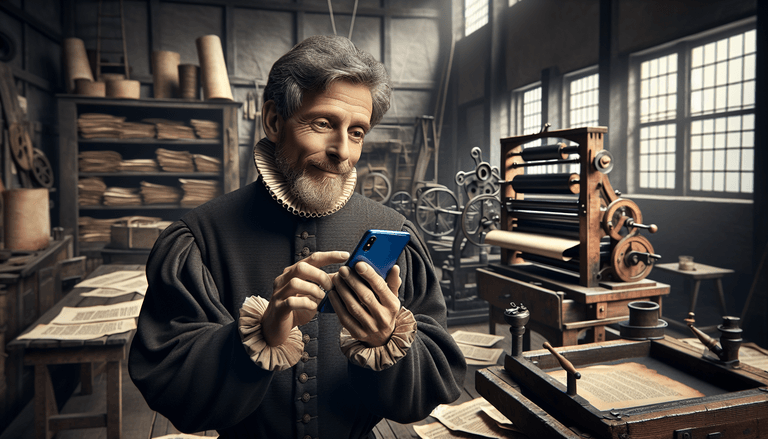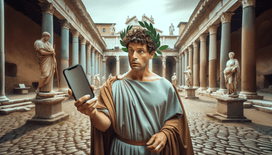Oh, the humble smartphone – that digital Swiss Army knife of the modern age. Essential for everything from checking the weather to capturing mid-sneeze selfies, it’s as indispensable as a quill was to a medieval scribe. But what if this pocket-sized powerhouse had travelled back through time to land squarely in the hands of Johannes Gutenberg? Sit back, dear reader, as we dive into the clutches of this curious quandary.
For those who need a moment to dust off their history tomes, Gutenberg was the chap who revolutionised the world with his invention of the movable type printing press in the mid-15th century. His press transformed the dissemination of information, effectively setting the stage for the Renaissance and eventually Facebook reunion groups. Now, imagine he's just unwrapped the latest smartphone, probably with a puzzled yet intrigued look on his face.
The Prologue: Gutenberg’s New Gadget
Picture it: Mainz, circa 1440. Our man Johannes is hunched over his press, tinkering with what seems like a chaotic assembly of wooden blocks and metal typefaces. In a comedic twist, a swirling vortex of mysterious origin deposits a smartphone at his feet. Not trusting it to be some trick of the devil or Merlin’s mischief, he cautiously picks it up, noticing the sleek design and curious glow.
A few pokes later, the home screen illuminates, flooding Gutenberg’s monkish workspace with a light bright enough to rival the sun itself. “What manner of contraption is this?” he mutters under his breath, inadvertently swiping through apps and accidentally summoning Siri, who’s ever-ready to assist. His workshop soon echoes with, “I’m sorry, I didn’t quite catch that,” as Gutenberg insists on conversing with this peculiar new ‘assistant’.
First Impressions: E-reader Overload
Once past the initial surprise, Gutenberg is amazed by the concept of e-books. Gone were the days of laboriously setting each letter by hand! Instead, he finds a digital library with enough tomes to make even the most studious monk perspire. The Gutenberg Bible, his 42-line masterpiece, could now be downloaded with a tap! Imagine his delight as he realises the potential for spreading scholarly texts far and wide without the faintest hint of ink on his hands.
Stories, histories, and every other 'ies' could be shared with such expedience that the only bottleneck would be how fast people could absorb the texts. “More people reading means more people thinking,” he muses, envisioning a Europe where ideas spread faster than plague and twice as effective.
Oh, the wonders of a camera! Instead of tediously documenting his work, Johannes could take selfies of his printing press, instantly sharing them with curious minds. Social media platforms, too, would be a game-changer. Imagine #Gutenberg trending on Twitter as he live-tweets his printing process, intermittently quipping about how much ink he saves. A carefully curated Instagram feed featuring moody black-and-white shots of freshly printed pages would surely land him a viral following.
With Gutenberg’s vision and a smartphone’s reach, the Bible isn’t just for those who can afford a hefty price. Free resources and shared knowledge open the proverbial floodgates to widespread literacy (and a slew of ‘what font is that?’ queries).
Threats and Tumult in Technicolour
Not everything would, of course, be picture-perfect. Competition would arise faster than you can say, "court injunction." The stakes of intellectual property theft would reach nail-biting levels at the age of instant piracy online. Gutenberg could very well find himself embroiled in a legal quagmire that makes Netflix copyright warning look like library fines.
Yet, amidst the upheaval, Johannes’s legacy would undoubtedly cast a wider net. Books might not just remain a luxury item for the few, but a societal staple just like a Starbucks coffee on a Monday morning.
The Epilogue: What Could Have Been
So, what if Johannes Gutenberg had a smartphone? Well, he might have traded his ink-stained smocks for a savvy and stylish jet-set lifestyle, popped over to TEDxMainz with his ground-breaking revelations, and perhaps even inspired some planetary-wide Open Source project.
Yet, in the grand scheme of things, let us not forget, it was the mind behind the movable type, not just the gadgetry, that truly revolutionised the world. Still, in such a quirky, Gutenberg-with-a-smartphone reality, one can only imagine that our past might converse a little more with our present, illuminating the path to future innovations.
And with that, dear readers, I must go. The time-machine app on my phone needs updating. Who knows which timeline I’ll drop into next!







